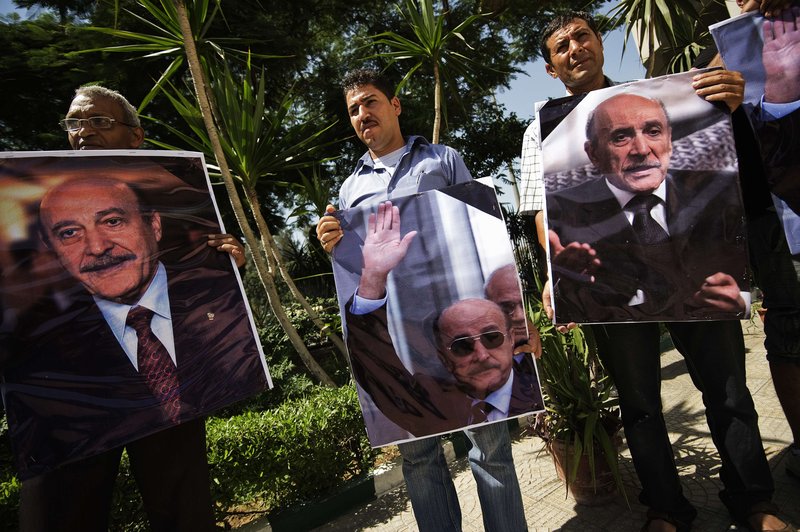
“You told me you were going to be like a bulldozer which paves the way…where is that bulldozer?” This figure of speech was used by President Abdel Fattah Al-Sisi, aimed at Prime Minister Ibrahim Mehleb in a Sunday public speech.
“President kids PM”, newspapers headlines read the next morning. But anybody who followed the pattern of the president in handling his ministers knows that the real meaning of those words is ‘you are in trouble’.
The implications of Al-Sisi’s ‘friendly’ admonition to Mehleb have a significant meaning in terms of the president’s evaluation of the performance of his government, especially his most loyal men. Ever since he came to power, Al-Sisi spoke of reform in state institutions, and repeatedly expressed that there would be zero tolerance of failure and corruption.
On one hand, some fatal mistakes led their actors out of the cabinet, such as former minister of justice Mahfouz Saber, who was dismissed the following day after he made outrageous classist comments. In another less obvious and more obscure circumstance, Al-Sisi let go of one of his most important men, Mohamed Ibrahim.
Ibrahim, who had been appointed as minister of interior by former president Mohamed Morsi, was also the face of the war on the Muslim Brotherhood later on, notably in the bloody dispersal of the Rabaa Al-Adaweya and Al-Nahda sit-ins, followed by the raids of the towns of Kerdasa and Nahia.
Under his rule, hundreds have been killed and detained. Reports regarding the manner of his dismissal suggest that the minister was being “punished”, with suppositions that the reasons for his replacement were failed security policies, and lack of proper management of his institution. Some also said the man was not popular among his own people.
More likely, the reasons could be related to two events that came as the cherry on top of the cake that is the ministry’s record of violations and brutality against citizens, especially as the public outrage that followed those two incidents did not go unnoticed by the presidency.
Al-Sisi spoke of deceased Shaimaa Al-Sabbagh as his “own daughter”, and referred to the Air Defence Stadium case as “unfortunate”, which was followed by assurances that police officers would be held accountable for any violations they have committed.
Such stances by Al-Sisi indicate a firm hand in the leadership of the country, but also that he is leading on his own. His political vision of managing affairs – ambiguous as it is – appears to be quite different from the long inherited and ruined practices of the regimes of at least five decades back.
Yet, this does not translate into real change. Bribes are still widely used, citizens are not equal before the law, hospitals are inhumane, the educational system is more disastrous than ever, as now students’ lives are endangered on a daily basis, and most of all, Egypt’s never ending bureaucratic system persists, let alone the existence of any political or expression freedoms.
There is a gap here between Al-Sisi’s claimed ‘reformist’ policies on the one hand and his decisions on the other, which eventually led to unchanged practices of the regime. For one, the president’s choice of officials does not reflect the ‘reformist’ speech. Newly appointed Minister of Justice Ahmed Al-Zind was even more discriminating than the sacked Mahfouz.
Another issue is the non-alignment of state institutions with the president. The most obvious example is the Ministry of Interior, which shamelessly continues to bully citizens, despite Al-Sisi’s public condemnations of police violations.
The president is giving the impression that he has to struggle on his own. “Nobody wanted responsibility,” said Al-Sisi, claiming it took him months to find suitable candidates to become governors. “We take recourse to the president in order to overpower other state institutions,” said head of the state-affiliated National Council for Human Rights Mohamed Fayeq.
When the president has to personally step in to rescue an old homeless lady, or help with a family’s rickety house, or even pay for 102-year-old Zeinab Hassan so that she is able to make the considerably expensive Mecca pilgrimage, then it is fair to conclude that local municipalities, ministries, political parties and civil society are useless.
It seems the regime is suffering from increased inconsistency between different state powers, which is becoming more visible in times of crisis. A new wave of ministerial dismissals might happen again in the economic and financial sectors,
What the president does not seem to grasp is that any dictator is doomed to fail, even one with good intentions towards the people. Al-Sisi did not have to apologise or take single responsibility for police attacks on lawyers. Besides that it was not his mistake to bear, his apology will not force the police to stop.
Despite the president’s best efforts, neither in the police, nor in any other governmental body will there be improvement without a meticulous strategy from bottom to top. In order for the less privileged vast majority to witness real improvements, there must also be less stubbornness with regard to decentralising presidential powers.
As a first step, a modern democratic state needs a parliament as soon as possible. As a second step, there must be fast and harsh retribution for those who use bribes, personal connections, and the like, as normal standards and not by president orders. As a third step, the abusive security justification of human rights violations must end by all means.



